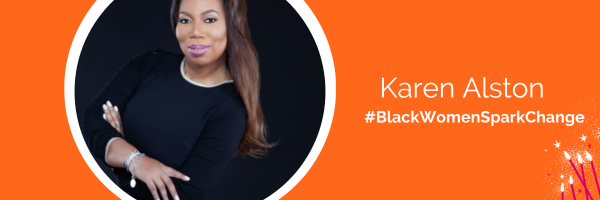
She’s helping thousands find their voices, as a business leader and nonprofit board member
Karen Alson never envisioned working in the nonprofit arena. A graduate of Howard University, Karen dove into the business world post-graduation, working at global enterprises such as JP Morgan, MBNA Bank and AOL. But, years into her corporate rise, Karen took a leap of faith: in 2002 she launched her own creative marketing agency, Alston Marketing Group. Even then, though, nonprofit wasn’t top-of-mind.
Everything changed when Karen was involved in a horrific bicycle accident. During her recovery, a close friend and mentor Cassandra Pinkney, the founder of Eagle Academy Public Charter School, offered Karen free office space to alleviate some of her financial burdens. Watching the inner working of the school, Karen was inspired by their mission, vision and impact—so much so that, when Cassandra unexpectedly passed away in 2016, Karen jumped in to keep things moving forward.
“I decided to stay and help—to really get the word out about what Cassandra had accomplished,” Karen explains. “My friend—my mentor—had created so much, and I thought more people needed to see it and experience her work first-hand.”
Unbeknownst to Karen, this campaign would kick off a career helping others through storytelling. Soon after, Karen joined the board of Edgewood Brookland Family Support Collaborative as Vice-President. This community-based collaborative manages a neighborhood-based family support system in the city’s wards 5 and 6, where Karen had recently moved.
“I didn’t consider myself to be a gentrifier,” she says. “As a person of color, it’s hard to accept that you too are a gentrifier. But once I fully understood that I wanted to give back. A friend asked me to join the board of E/BFSC. And that process helped me tremendously to become a better neighbor.”
Again, Karen brought her unique brand of storytelling to the forefront.
“Storytelling gets people to connect. Storytelling can fight bias,” she says. “I’m an advocate for positive narratives. Not ‘underprivileged,’ ‘underserved,’ ‘economically insecure.’ I hate those words because people start to associate black and brown with these words.” Community support, she notes, starts from within the community, so the way community members see and speak to one another is critical.
“We’re going through a change and a reckoning in this country,” Karen says. “We’re going through an awakening where a lot of people who didn’t understand racial challenges, barriers and strife are learning about it in a way that they had no idea. People understand there’s racism, but they really don’t understand privilege.”
Despite the challenges, Karen says she has many reasons to be hopeful—and many reasons to push ahead with her storytelling approach. She is inspired by the millennials and their commitment to equality as well as their understanding of the intersectionality of privilege and impact as a force of good in society.
“The moment calls for us to stand up and to be disruptive,” Karen says. “Storytelling is a powerful force to do just that.”
